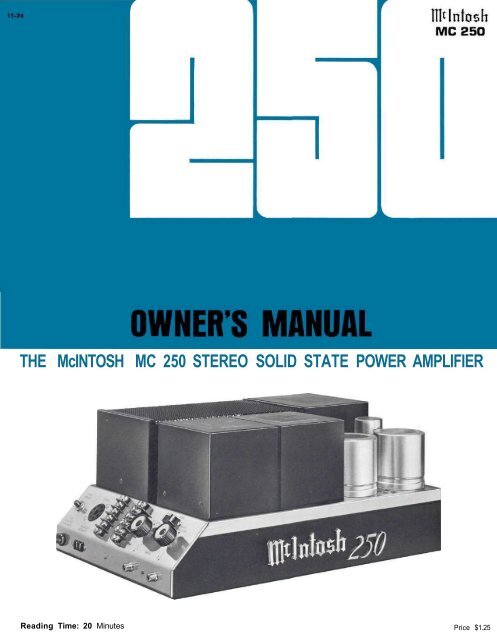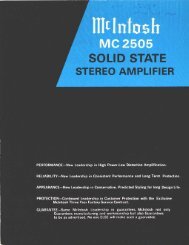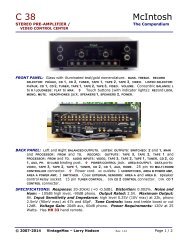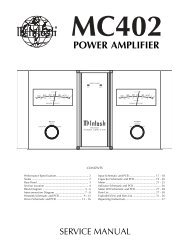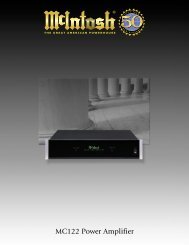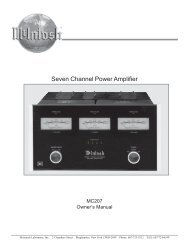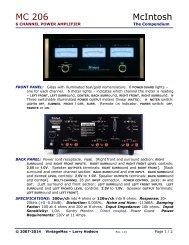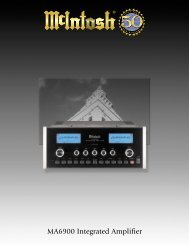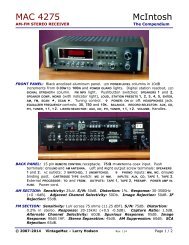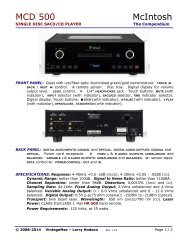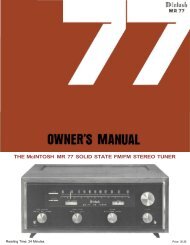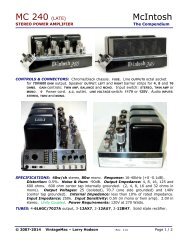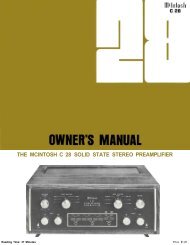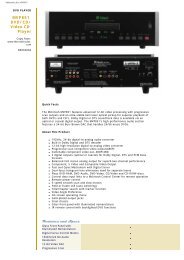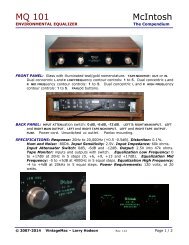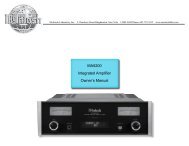THE McINTOSH MC 250 STEREO SOLID STATE POWER AMPLIFIER
THE McINTOSH MC 250 STEREO SOLID STATE POWER AMPLIFIER
THE McINTOSH MC 250 STEREO SOLID STATE POWER AMPLIFIER
Create successful ePaper yourself
Turn your PDF publications into a flip-book with our unique Google optimized e-Paper software.
<strong>THE</strong> <strong>McINTOSH</strong> <strong>MC</strong> <strong>250</strong> <strong>STEREO</strong> <strong>SOLID</strong> <strong>STATE</strong> <strong>POWER</strong> <strong>AMPLIFIER</strong><br />
Reading Time: 20 Minutes Price $1.25
Your <strong>MC</strong> <strong>250</strong> Stereo Amplifier<br />
will give you many years of pleasant<br />
and satisfactory performance. If you<br />
have any questions, please contact:<br />
CUSTOMER SERVICE<br />
Mclntosh Laboratory Inc.<br />
2 Chambers Street<br />
Binghamton New York 13903<br />
Phone: 607-723-3512<br />
WARNING: TO PREVENT FIRE OR SHOCK<br />
HAZARD, DO NOT EXPOSE THIS UNIT TO RAIN<br />
OR MOISTURE.<br />
Take Advantage of 3 years<br />
of FREE Service ...<br />
Fill in the Application NOW.<br />
CONTENTS<br />
SERVICE CONTRACT 1<br />
INSTALLATION 2<br />
HOW TO CONNECT 2, 3<br />
CONTROL PANEL INFORMATION 4<br />
LISTENING TO YOUR <strong>STEREO</strong> SYSTEM 4<br />
PERFORMANCE LIMITS AND RATINGS 5<br />
PEFORMANCE CHARTS 6<br />
TECHNICAL DESCRIPTION 7<br />
BLOCK DIAGRAM 8<br />
THREE YEAR SERVICE CONTRACT<br />
An application for a FREE THREE YEAR SERVICE CONTRACT is included with this manual.<br />
The terms of the contract are:<br />
1. Mclntosh will provide all parts, materials and<br />
labor needed to return the measured performance<br />
of the instrument to the original performance<br />
limits free of any charge. The<br />
SERVICE CONTRACT does not cover any shipping<br />
costs to and from the authorized service<br />
agency or the factory.<br />
2. Any Mclntosh authorized service agency will<br />
repair all Mclntosh instruments at normal<br />
service rates. To receive the free service under<br />
the terms of the SERVICE CONTRACT, the<br />
SERVICE CONTRACT CERTIFICATE must accompany<br />
the instrument when taken to the<br />
service agency.<br />
3. Always have service done by a Mclntosh<br />
authorized service agency. If the instrument<br />
is modified or damaged, as a result of unauthorized<br />
repair the SERVICE CONTRACT<br />
will be cancelled. Damage by improper use<br />
or mishandling is not covered by the SERV-<br />
ICE CONTRACT.<br />
4. The SERVICE CONTRACT is issued to you as<br />
the original purchaser. To protect you from<br />
misrepresentation this contract cannot be<br />
transferred to a second owner.<br />
5. For your protection Mclntosh selects only<br />
dealers who have technical competence to<br />
guide purchasers fairly, and provide service<br />
when necessary. To receive the SERVICE<br />
CONTRACT your purchase must be made<br />
from a Mclntosh franchised dealer.<br />
6. Your completely filled in application for a<br />
SERVICE CONTRACT must be postmarked<br />
within 30 days of the date of purchase of<br />
the instrument.<br />
7. To receive the SERVICE CONTRACT all information<br />
on the application must be filled<br />
in. The SERVICE CONTRACT will be issued<br />
when the completely filled in application<br />
is received at Mclntosh Laboratory Incorporated<br />
in Binghamton, New York.<br />
1<br />
Copyright © 1970 by Mclntosh Laboratory, Inc.
Installation<br />
Adequate ventilation extends the troublefree<br />
life of electrical instruments. It is generally<br />
found that each 10° centigrade (18° F)<br />
rise in temperature reduces the life of electrical<br />
insulation by one half. Adequate ventilation<br />
is an inexpensive and effective means<br />
of preventing insulation breakdown that results<br />
from unnecessarily high operating temperatures.<br />
The direct benefit of adequate<br />
ventilation is longer, trouble-free life.<br />
The suggested minimum space for mounting<br />
the <strong>MC</strong> <strong>250</strong> is 18 inches long X 8 inches<br />
wide X 11½ inches high. Always allow for air<br />
flow by either ventilation holes or space next<br />
to the bottom of the amplifier and a means<br />
for the warm air to escape at the top.<br />
It is recommended that the <strong>MC</strong> <strong>250</strong> be<br />
mounted in a normal or horizontal position.<br />
However with adequate ventilation, the amplifier<br />
can be mounted in any position except<br />
upside down. If the amplifier is to be installed<br />
on a vertical surface it is recommended that<br />
the autoformers be on the down side. This<br />
position permit greater air flow around the<br />
transistors and component parts thereby extending<br />
the trouble-free life of the amplifier.<br />
HOW to Connect<br />
INPUT—<strong>STEREO</strong><br />
The shielded cable from the left output of the Mclntosh<br />
preamplifier is plugged into the left jack. The<br />
shielded cable from the right output of the Mclntosh<br />
preamplifier is plugged into the right jack. The INPUT<br />
switch must be in the <strong>STEREO</strong> position and the OUT-<br />
PUT properly connected to the stereo loudspeakers<br />
or distortion and loss of power may result.<br />
INPUT—MONO<br />
The shielded cable from the program source is<br />
plugged into the right jack. The INPUT switch must<br />
be in the MONO position and the OUTPUT properly<br />
connected for mono loudspeaker operation or distortion<br />
and loss of power may result.<br />
INPUT—<strong>STEREO</strong> OR TWIN <strong>AMPLIFIER</strong>S<br />
For stereo or twin channel operation it is not necessary<br />
to use the same impedance loudspeaker on<br />
each output. Simply connect each channel for the<br />
impedance desired.<br />
2<br />
SPEAKERS<br />
Speakers are connected at the barrier strips<br />
marked OUTPUT on the sloped panel of the amplifier.<br />
Use lamp cord, bell wire, or wire with similar type<br />
of insulation to connect the speakers to the amplifier.<br />
For the normally short distances of under 50 feet between<br />
the amplifier and speaker, #18 wire or larger<br />
can be used. For distances over 50 feet between the<br />
amplifier and speaker use larger wire.<br />
The loudspeaker impedance is usually identified<br />
on the loudspeaker itself. Connect one of the leads<br />
from the left loudspeaker to the screw marked COM<br />
on the LEFT OUTPUT barrier strip. Connect the other<br />
lead from the left loudspeaker to the screw marked<br />
with the number corresponding to the speaker impedance<br />
on the LEFT OUTPUT barrier strip. Connect one<br />
of the leads from the right loudspeaker to the screw<br />
marked COM on the RIGHT OUTPUT barrier strip.<br />
Connect the other lead from the right loudspeaker<br />
to the screw marked with the number corresponding<br />
to the speaker impedance on the RIGHT OUTPUT<br />
barrier strip.<br />
The only adverse effect on the operation of a Mclntosh<br />
amplifier when it is improperly matched is a<br />
reduction in the amount of distortion-free power<br />
available to the loudspeaker. Close impedance<br />
matching is desirable for maximum distortion-free<br />
power.<br />
SPEAKER CONNECTIONS<br />
Use this table to determine proper speaker connection:<br />
If the speaker impedance<br />
is between:<br />
3.2 to 6.5 ohms<br />
6.5 to 13 ohms<br />
13 to 26 ohms<br />
<strong>STEREO</strong> OUTPUT—CONNECTING TO<br />
BARRIER STRIPS<br />
Connect the<br />
speaker leads<br />
between COM and:<br />
4 ohms<br />
8 ohms<br />
16 ohms<br />
Use this table for stereo connections using the<br />
barrier strips:<br />
Connect one<br />
If the speaker<br />
impedance is:<br />
4 ohms<br />
8 ohms<br />
16 ohms<br />
Connect one left<br />
speaker to<br />
screw<br />
LEFT-COM and<br />
other to:<br />
LEFT-4<br />
LEFT-8<br />
LEFT-16<br />
right speaker<br />
lead to the<br />
screw marked<br />
RIGHT-COM and<br />
the other to:<br />
RIGHT-4<br />
RIGHT-8<br />
RIGHT-16<br />
For 25 volt line operation connect one of the left<br />
leads to the screw marked COM on the LEFT OUT-<br />
PUT barrier strip. The other left lead is connected<br />
to the screw marked 16 on the LEFT OUTPUT barrier
strip. Connect the right leads in the same manner on<br />
the RIGHT OUTPUT barrier strip.<br />
When connected as above the <strong>MC</strong> <strong>250</strong> operates<br />
as a 50 watt per channel stereo amplifier.<br />
MONOPHONIC OUTPUT— CONNECTING<br />
TO BARRIER STRIPS<br />
When the <strong>MC</strong> <strong>250</strong> is to operate as a monophonic<br />
amplifier, the two channels are combined to produce<br />
a single 100 watt output. This chart lists the proper<br />
connections and interconnections for monophonic<br />
operation.<br />
If the<br />
speaker<br />
impedance<br />
is:<br />
2 ohms<br />
4 ohms<br />
8 ohms<br />
Connect one<br />
speaker to the<br />
screw marked<br />
LEFT-COM<br />
and the other<br />
to:<br />
LEFT-4<br />
LEFT-8<br />
LEFT-16<br />
For constant voltage<br />
25 volts LEFT-16<br />
Connect a<br />
wire between:<br />
LEFT-4 and RIGHT-4<br />
LEFT-8 and RIGHT-8<br />
LEFT-16 and RIGHT-16<br />
LEFT-16 and RIGHT-16<br />
When connected as above the <strong>MC</strong> <strong>250</strong> operates as<br />
a 100 watt per channel monophonic amplifier.<br />
<strong>STEREO</strong> OUTPUT —CONNECTING<br />
TO <strong>THE</strong> OCTAL SOCKET<br />
The octal socket marked OUTPUT can be used<br />
for all of the output impedances and voltages. Connections<br />
are made in the following fashion:<br />
If the<br />
impedance is:<br />
4 ohms<br />
8 ohms<br />
16 ohms<br />
Solder the left<br />
channel leads<br />
between:<br />
Pin 1 and 2<br />
Pin 1 and 3<br />
Pin 1 and 4<br />
For constant voltage<br />
25 volts Pin 1 and 4<br />
Solder the right<br />
channel leads<br />
between:<br />
Pin 5 and 6<br />
Pin 5 and 7<br />
Pin 5 and 8<br />
Pin 5 and 8<br />
When connected as outlined the <strong>MC</strong> <strong>250</strong> operates<br />
as a 50 watt per channel stereo amplifier.<br />
MONOPHONIC OUTPUT -<br />
TO <strong>THE</strong> OCTAL SOCKET<br />
If the<br />
impedance is:<br />
2 ohms<br />
4 ohms<br />
8 ohms<br />
25 volts<br />
CONNECT<br />
2 and 6<br />
3 and 7<br />
4 and 8<br />
4 and 8<br />
CONNECTING<br />
Solder the leads<br />
to:<br />
1 and 2<br />
1 and 3<br />
1 and 4<br />
1 and 4<br />
When connected as outlined the <strong>MC</strong> <strong>250</strong> operates<br />
as a 100 watt monophonic amplifier.<br />
AC <strong>POWER</strong>:<br />
The <strong>MC</strong> <strong>250</strong> operates on 117 to 130 volt, 50/60<br />
Hz. The amplifier will be turned on and off if its<br />
power cord is plugged in one of the auxiliary AC<br />
outlets on the program source.
control Panel Information<br />
INPUT<br />
The input of the <strong>MC</strong> <strong>250</strong> has a two position switch<br />
to permit the amplifier to be used in any one of<br />
three ways:<br />
(1) As a monophonic 100 watt amplifier.<br />
(2) As twin 50 watt amplifiers used with an electronic<br />
crossover network, or as two completely<br />
separate amplifiers.<br />
(3) As a stereo amplifier used with a Mclntosh<br />
preamplifier or other high output stereo program<br />
sources.<br />
In either position of the input switch the input<br />
sensitivity is 0.5 volts for full rated output. The input<br />
impedance is 200,000 ohms.<br />
In the <strong>STEREO</strong> position each input is controlled<br />
by a GAIN control. The GAIN control allows signal<br />
sources of 0.5 volt up to 30 volts to be connected<br />
without overloading the input to the amplifier.<br />
The MONO position of the input switch parallels<br />
the inputs of both amplifiers. When the outputs are<br />
properly connected the <strong>MC</strong> <strong>250</strong> becomes a 100 watt<br />
monophonic amplifier. The RIGHT/MONO GAIN control<br />
permits connecting signal sources up to 30 volts<br />
without overloading the amplifier's input. To operate<br />
the <strong>MC</strong> <strong>250</strong> as a 100 watt monophonic amplifier the<br />
INPUT switch must be in the MONO position and the<br />
OUTPUT must be properly connected for monophonic<br />
operation.<br />
OUTPUT<br />
The two barrier terminal strips marked LEFT OUT-<br />
PUT and RIGHT OUTPUT provide stereo connections<br />
for the normal speaker impedances of 4 ohms, 8<br />
ohms, and 16 ohms, or monophonic operation connections<br />
for 2 ohms, 4 ohms, and 8 ohms. The terminal<br />
strips may also be connected for a constant<br />
voltage output of 25 volts in either stereo or mono.<br />
OUTPUT (Octal Socket)<br />
The octal socket marked OUTPUT has stereo connections<br />
for 4 ohms, 8 ohms, 16 ohms, and 25 volts.<br />
For monophonic operation the octal socket provides<br />
connections for 2 ohms, 4 ohms, 8 ohms, and 25<br />
volts.<br />
AC OUTLET<br />
The auxiliary AC outlet can be used to supply<br />
power to other equipment in the system. The outlet<br />
will provide a maximum of 300 watts of power. The<br />
AC outlet is not fused.<br />
LINE VOLTAGE<br />
The <strong>MC</strong> <strong>250</strong> operates on any line voltages<br />
between 117 volts and 130 volts, 50/60 Hz<br />
Listening to Your stereo System<br />
SETTING <strong>THE</strong> GAIN CONTROLS:<br />
To set the GAIN controls for a stereo system use<br />
a monophonic signal from the program source. A<br />
monophonic signal supplies the same voltage to both<br />
channels. Turn the volume control on the source<br />
equipment to the 12 o'clock position (half rotation).<br />
Turn up the LEFT GAIN control until the loudness<br />
in the room is about as loud as you like to listen.<br />
Then turn the GAIN control on the RIGHT INPUT until<br />
it is equally as loud as the left channel. The system<br />
is now balanced for loudness and provides the greatest<br />
range of operation and loudness change when<br />
using the volume control on the source equipment.<br />
NOW SIT BACK AND ENJOY YOUR <strong>MC</strong>INTOSH.<br />
4
Performance Limits and Ratings<br />
PERFORMANCE GUARANTEE<br />
Performance Limits are the maximum deviation from<br />
perfection permitted for a Mclntosh instrument. We<br />
promise you that the <strong>MC</strong> <strong>250</strong> you buy must be capable<br />
of performance at or exceeding these limits or you get<br />
your money back. Mclntosh is the only manufacturer<br />
that makes this guarantee.<br />
PERFORMANCE<br />
Mclntosh audio power ratings are in accordance with<br />
the Federal Trade Commission Regulation of November<br />
4, 1974 concerning power output claims for amplifiers<br />
used in home entertainment products.<br />
<strong>POWER</strong> OUTPUT<br />
<strong>STEREO</strong><br />
50 watts minimum sine wave continuous<br />
average power output, per channel, both<br />
channels operating into 4 ohms, 8 ohms,<br />
or 16 ohms load impedance, which is:<br />
14.1 volts RMS across 4 ohms<br />
20.0 volts RMS across 8 ohms<br />
28.3 volts RMS across 16 ohms<br />
MONO<br />
100 watts minimum sine wave continuous<br />
average power output, operating into 2<br />
ohms, 4 ohms, or 8 ohms load impedance,<br />
which is:<br />
14.1 volts RMS across 2 ohms<br />
20.0 volts RMS across 4 ohms<br />
28.3 volts RMS across 8 ohms<br />
OUTPUT LOAD IMPEDANCE<br />
<strong>STEREO</strong><br />
4 ohms, 8 ohms, or 16 ohms; separate terminals<br />
are provided for each output<br />
MONO<br />
2 ohms, 4 ohms, or 8 ohms; separate<br />
terminals are provided for each output<br />
RATED <strong>POWER</strong> BAND<br />
20 Hz to 20,000 Hz<br />
TOTAL HARMONIC DISTORTION<br />
<strong>STEREO</strong><br />
0.25% maximum harmonic distortion at<br />
any power level from <strong>250</strong> milliwatts to 50<br />
watts per channel from 20 Hz to 20,000 Hz,<br />
both channels operating<br />
MONO<br />
0.25% maximum harmonic distortion at<br />
any power level from <strong>250</strong> milliwatts to 100<br />
watts from 20 Hz to 20,000 Hz<br />
INTERMODULATION DISTORTION<br />
<strong>STEREO</strong><br />
0.25% if instantaneous peak power output is 100 watts<br />
or less per channel with both channels operating for<br />
any combination of frequencies 20 Hz to 20,000 Hz<br />
MONO<br />
0.25% if instantaneous peak power output is 200 watts<br />
or less for any combination of frequencies 20 Hz to<br />
20,000 Hz<br />
FREQUENCY RESPONSE (at 1 watt output)<br />
20 Hz to 20,000 Hz +0 -0.25 dB<br />
10 Hz to 100,000 Hz +0 -3.0 dB<br />
NOISE AND HUM<br />
90 dB below rated output<br />
OUTPUT VOLTAGES<br />
RATINGS<br />
Stereo and Mono<br />
25 volts for distribution lines<br />
DAMPING FACTOR<br />
15 at 3 ohms output<br />
38 at 8 ohms output<br />
17 at 16 ohms output<br />
INPUT IMPEDANCE<br />
200,00 Ohms<br />
INPUT SENSITIVITY<br />
0.5 volt. Level control provided for higher input voltage<br />
GENERAL INFORMATION<br />
<strong>POWER</strong> REQUIREMENTS<br />
120 volts, 50/60 Hz, 50 watts at zero signal output, <strong>250</strong><br />
watts at rated output<br />
SEMICONDUCTOR COMPLEMENT<br />
24 silicon transistors<br />
18 silicon rectifiers and diodes<br />
MECHANICAL INFORMATION<br />
SIZE<br />
7 1/16 inches high (17.94 cm), 10 5 /8 inches wide (26.99<br />
cm), 15 5 /8 inches deep (39.69 cm)<br />
CHASSIS<br />
Chrome and black<br />
WEIGHT<br />
36 pounds (16.33 kg) net, 40 pounds (18.14 kg) in shiping<br />
carton<br />
5
Technical Description<br />
A two stage preamplifier with three transistors in<br />
each channel increases the input voltage 16 dB.<br />
There are 13 transistors in each power amplifier<br />
section. The two stage preamplifier is fed to a pair of<br />
matched transistors arranged as an emitter coupled<br />
amplifier with two inputs and one output. The signal<br />
from the preamplifier section connects to one of<br />
these inputs. Both AC and DC negative feedback are<br />
applied to the other input. This large quantity of<br />
feedback is used to reduce noise and distortion. The<br />
signal is then fed to a voltage amplifier. The voltage<br />
amplifier is followed by two driver transistors.<br />
The output section is arranged as a series pushpull<br />
amplifier. The power transistors used in the output<br />
section of your <strong>MC</strong> <strong>250</strong> are selected for their high<br />
power dissipation capability, wide frequency response,<br />
and large "safe operating area." In addition,<br />
each power transistor is given four separate tests<br />
before it is put in your <strong>MC</strong> <strong>250</strong>. This additional testing<br />
makes sure your <strong>MC</strong> <strong>250</strong> will deliver its rated<br />
power from 20 Hz to 20,000 Hz with low distortion<br />
and complete reliability.<br />
The power transistors are mounted on oversized<br />
anodized heat sinks. The heat sinks assure that under<br />
normal operation the transistors will operate at<br />
a low temperature. If temperatures increase due to a<br />
shorted speaker, or restricted ventilation, an automatic<br />
temperature sensing device turns off the <strong>MC</strong><br />
<strong>250</strong>. The device operates automatically at a preset<br />
temperature. The <strong>MC</strong> <strong>250</strong> will turn on again when the<br />
temperature has returned to normal limits. This additional<br />
feature gives your <strong>MC</strong> <strong>250</strong> complete reliability<br />
under the most extreme operating conditions.<br />
The output stages are matched to the load by the<br />
Mclntosh autoformer. The Mclntosh autoformer is<br />
carefully wound using Mclntosh trifilar winding and<br />
interleaving techniques. Trifilar winding and interleaving<br />
gives the autoformers exceptional bandwidth.<br />
The autoformers properly match the power<br />
transistors to 4, 8, and 16 ohm loads at all audio<br />
frequencies.<br />
The use of the Mclntosh designed trifilar autoformer<br />
makes the Mclntosh solid state amplifiers the<br />
only amplifiers that deliver FULL <strong>POWER</strong> AT ALL<br />
SPEAKER IMPEDANCES. You have not been power<br />
penalized for your choice of loudspeakers when<br />
using the Mclntosh <strong>MC</strong> <strong>250</strong>.<br />
Another of the advantages of the autoformers is<br />
the 25 volt output for a constant voltage distribution<br />
system. With the <strong>MC</strong> <strong>250</strong> several sets of speakers<br />
can be operated independently throughout your<br />
home.<br />
7<br />
To further insure reliability a special power output<br />
SENTRY MONITORING CIRCUIT prevents failure of<br />
the power output transistors due to excessive mismatch<br />
of the output. When your <strong>MC</strong> <strong>250</strong> operates<br />
normally the SENTRY MONITORING CIRCUIT has no<br />
effect on signals passing through the power amplifier.<br />
If the power dissipation should rise above normal<br />
operation, the SENTRY MONITORING CIRCUIT<br />
restricts the drive to the output transistors. The<br />
SENTRY MONITORING CIRCUIT acts instantaneously<br />
for any input signal or load combination. This arrangement<br />
assures complete circuit reliability. Only<br />
Mclntosh gives you this degree of protection.<br />
There are three separate power supply sections,<br />
One positive and one negative high current supply<br />
is used for the output stages. The other positive supply<br />
is used for the driving amplifier stages. All supplies<br />
are full wave and use silicon rectifiers. Adequate<br />
filtering is used to assure an absolute minimum<br />
of hum. The power output stage filter capacitors have<br />
very high capacity, which allows full power output<br />
below 20 Hz. The power transformer is generous in<br />
size and runs cool, even under heavy use.
<strong>MC</strong>INTOSH LABORATORY INC.<br />
2 CHAMBERS ST., BINGHAMTON, N. Y. 13903<br />
607-723-3512<br />
Design subject to change without notice.<br />
Printed in U.S.A.<br />
038-918


